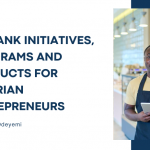The Development Bank of Nigeria (DBN) has disbursed over N1.1 trillion to Micro, Small, and Medium Enterprises (MSMEs) since it began operations in 2017. Managing Director and Chief Executive Officer, Dr. Tony Okpanachi, revealed this while speaking at the International Monetary Fund (IMF)/World Bank Spring Meetings in Washington DC.
Okpanachi emphasized that the current global uncertainties have made the intervention role of development finance institutions critical. He noted that access to finance remains a major challenge for small businesses and entrepreneurs, especially in economies facing high inflation and unemployment rates like Nigeria. According to him, DBN’s mission is to provide long-term capital that enables entrepreneurs to create jobs and drive sustainable development.
Highlighting DBN’s collaborations, Okpanachi explained that the bank partners with 79 financial institutions across Nigeria, including commercial banks, microfinance banks, and mortgage banks, to extend financing to small businesses. Rather than competing with other financial institutions, DBN complements their efforts by offering longer-tenor, patient capital. He also noted that DBN mobilizes international funding through partnerships with global organizations, ensuring businesses can access concessional financing that private institutions may not easily obtain.
In its drive to support Nigeria’s youthful population, Okpanachi said DBN is actively working on initiatives that provide equity financing and long-term loans of up to 10 years for startups. He added that the bank does not only focus on financing but also on capacity building to ensure businesses are properly prepared and bankable. Furthermore, DBN has partnered with organizations such as KfW and secured accreditation from the Green Climate Fund (GCF) to channel targeted financing to climate-focused sectors.
On the impact of global economic shifts, Okpanachi stated that DBN’s international partners remain optimistic about Nigeria’s ongoing reforms and are offering innovative financial tools like de-risking instruments. However, he acknowledged that rising interest rates and macroeconomic challenges within Nigeria have contributed to an increase in non-performing loans. Despite these challenges, he said the direct impact of global tariff tensions on Nigeria remains limited due to the country’s major reliance on crude oil exports.
Speaking on intra-African trade, Okpanachi pointed out that DBN is investing in capacity building for SMEs to ensure their products meet international standards and can compete across the continent. He stressed that quality standards must remain globally competitive even when trading within Africa.
To ensure its long-term sustainability, Okpanachi explained that DBN maintains market-conforming pricing and raises funds in ways that support its development mandate without compromising financial health. He revealed that the bank’s operations are fully digitalized, allowing electronic access to services, loan disbursements, and capacity-building programs. As a wholesale DFI without branch networks, DBN relies heavily on technology to extend its reach nationwide.
Okpanachi also noted that the Central Bank of Nigeria’s recent shift away from direct development finance provides opportunities for institutions like DBN to assume a greater role. He stated that DBN is prepared to work with the CBN on frameworks that allow it and other DFIs to deliver targeted financing to sectors that need support.
Since its inception, DBN has facilitated loans to over 711,000 MSMEs through its partners, resulting in the creation of nearly 1.2 million jobs. Okpanachi highlighted that more than 80 percent of the loan recipients are women-owned businesses, and the bank is increasing its focus on supporting youth-owned enterprises and businesses in underserved regions such as Nigeria’s Northeast.










